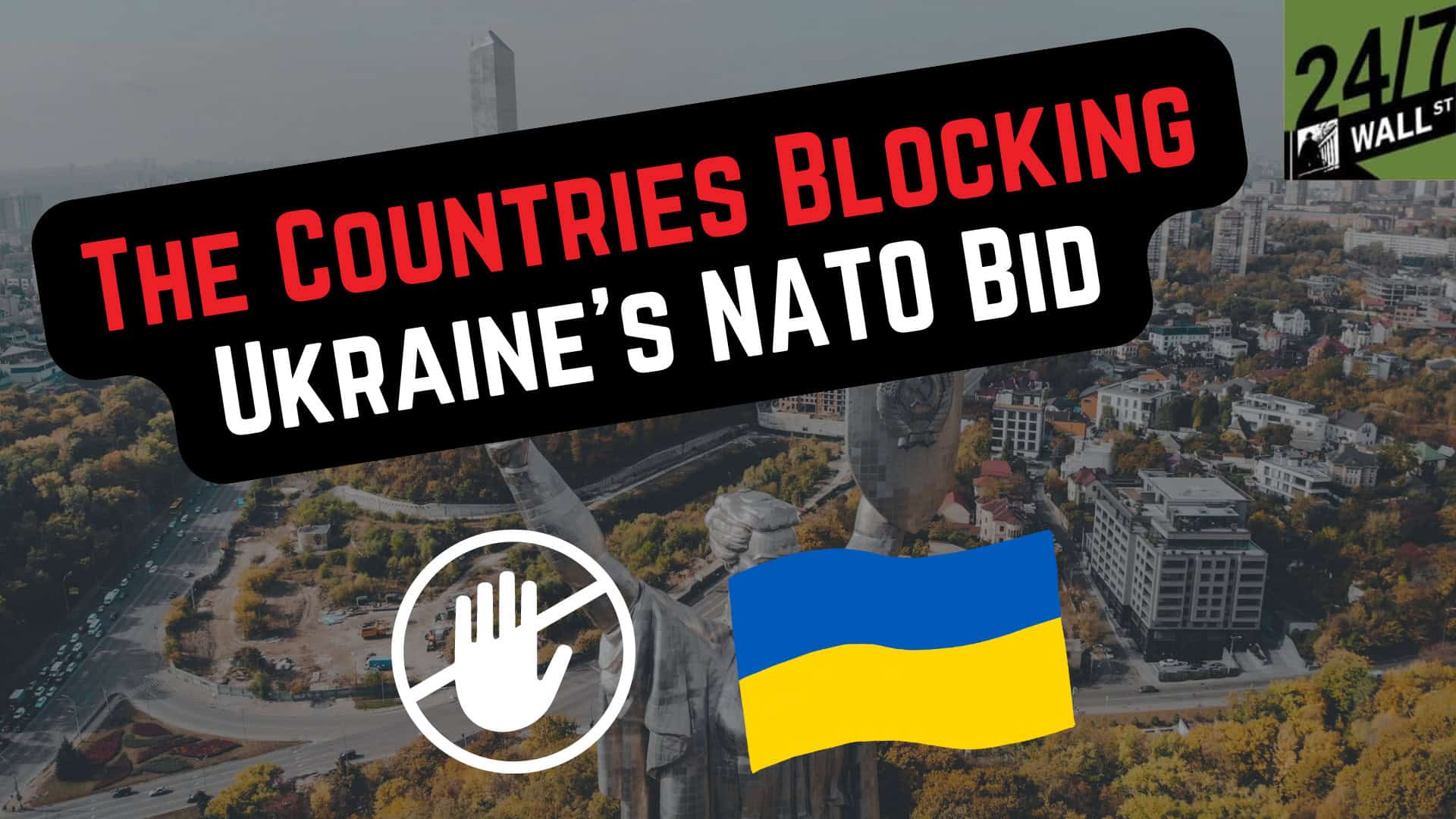
Key Points:
- Ukraine’s NATO membership faces resistance from Germany, France, Hungary, and Slovakia due to conflict concerns.
- Hungary and Slovakia are blocking aid and opposing NATO membership for Ukraine.
- Internal politics and future elections, especially in the US, will impact Ukraine’s NATO chances.
- Also: Smart money is placing bets for 2025’s best investment, and “the next Nvidia” is a frontrunner. Click here to learn more now.
Austin and Michael delve into the complexities of Ukraine’s long-standing ambition to join NATO and the internal divisions within the alliance that impact this goal. They discuss the historical context, starting with Ukraine’s post-Soviet Union stance of neutrality and the shifts in its foreign policy over the years, influenced by pro-Western and pro-Moscow leaders. A significant moment was the 2008 Bucharest summit, where despite U.S. pressure, Germany and France opposed Ukraine’s NATO membership due to concerns about provoking Russia. Today, nations like Hungary and Slovakia further complicate Ukraine’s NATO aspirations, particularly under leaders like Viktor Orban and Robert Fico, who have taken stances against supporting Ukraine’s NATO membership during the ongoing conflict with Russia.
Watch the Video
Edited Video Transcript:
So talk to me about those divisions.
What do they look like?
Sure.
So Ukraine and NATO is a really interesting thing to talk about because it doesn’t start.
You know, in the last couple of years, this is something that goes way back and it’s getting to the point that we’re talking about sort of postwar realignment.
So we’re we can also get to the post, excuse me, post Cold War realignment that took place in Central and Eastern Europe.
Excuse me.
A lot of these Central and Eastern European nations kind of moving away from the east.
So Ukraine has essentially it really kind of depended on who was in power at the time in the last sort of 30 years, had three directions that its foreign policy could go in.
The first one, which was actually what they originally set out to do, was the path of neutrality, non-alignment.
In fact, if I remember correctly, they’re…
Their declaration of sovereignty, of moving towards independence, was that they were going to be a nuclear-free, neutral nation after breaking away from the Soviet Union.
So that was one path.
The second one would be pivoting towards the West, as a lot of its neighbors did.
And then the third one is just maintaining good ties with Russia.
So there have been a couple of pro-Moscow presidents that have slowed down progress towards NATO.
Equally, there have been pro-West leaders.
So it really kind of depended on who was in power.
But NATO, excuse me, Ukraine first started exploring NATO membership in the early 90s, and it has just been uneven, its progress.
One of the real turning points regarding Ukraine and NATO was in 2008, the Bucharest summit.
This was a really pivotal moment in Ukraine and NATO’s history.
So the Bush administration at the time, so that was when George W. Bush was in the final year of his presidency, really strongly backed Ukraine’s ascension into NATO.
But there was significant pushback from Germany and France.
Angela Merkel was really wary of admitting Ukraine into the alliance.
She saw it as a really unnecessary provocation with Russia and something that people perhaps aren’t aware of.
Vladimir Putin spoke at that summit on the final day, which seems shocking now, but that was fairly normal at the time.
But in 2008, both Ukraine and Georgia were seeking membership.
And despite intense pressure from the Bush administration, in fact, I read a fascinating article that was going into detail.
Condoleezza Rice was in furious arguments with European leaders over this position.
Apparently was even moved to tears of anger just in sheer frustration that the the Germans and the French, they were the sort of the main resistance coalition.
But ultimately, no headway was made in terms of a definitive date.
But what was agreed was eventually, one day, who knows when, but Ukraine, Georgia will become members of NATO.
Germany’s position at the time and actually still present today is a nation that’s involved in a conflict or a major border dispute shouldn’t be admitted into NATO as a defensive alliance.
And one of the points that was made against the Germans back in 2008 was that you were in the exact same position in 1955 when you joined.
So why is it different?
So that was a major cause of tension, but ultimately it wasn’t resolved.
And then after that Ukraine kind of moved in a different political direction where, um, NATO membership wasn’t considered a huge priority at the time.
It was really divisive.
There wasn’t a clear majority for or against NATO membership.
So it was a little bit inconsistent.
Merkel, she spoke, um, about, I think last year to clarify her position, defend, um, what she did, because a lot of people were blaming her for, Ukraine not being part of NATO and the war happening.
But she said there was a lot of internal turmoil in Ukraine at the time.
It was a lot of corruption and there were just a lot of concerns.
So her successor is following quite a similar path in terms of what Ukraine becoming a part of NATO will look like.
Basically, as long as the conflict is ongoing, membership is completely off the table.
But that’s not only Germany that has that view.
France supported Germany back in 2008.
Sarkozy and Merkel were, you know, aligned in their viewpoint.
And that was really important because Germany didn’t have the pull to go it alone in their opposition to Ukraine joining.
So French support was really important.
But since then, France has taken on a more aggressive posture towards the war in Ukraine.
Emmanuel Macron has actually even floated the idea of NATO intervening in the conflict, which is something a lot of the other members are really not for.
So, yeah, there’s skepticism on that side.
But if we’re talking about the nations that really reject it, the main one would be Hungary under Viktor Orban.
So he’s kind of more far right authoritarian, seen as largely pro-Moscow.
He has been a sticking point in a lot of aid packages to Ukraine.
He’s held these up.
He’s insisted that Hungary will not take part in any NATO activities that support Ukraine.
He’s been quite adamant in that although I should also point out that he has said publicly that after the conflict he won’t stand in the way of Ukraine joining.
He just won’t have any part in supporting the war as it is now.
The other one is Slovakia.
At the start of the war they were very supportive of Ukraine.
They sent a lot of older equipment that again was very useful in the early part of the war.
But they were parliamentary elections and this is actually a recurring theme we’ll see over and over again is that internal politics has a huge bearing on the foreign policies of nations involved.
So they reelected Robert Fico for the third term, his third term as prime minister.
And he’s very skeptical of Ukraine.
Doesn’t want to send any further aid and has said that he will veto Ukraine’s membership because he believes that would cause a third world war.
It remains to be seen just how much pool Slovakia will have if they are going it alone and rejecting Ukraine’s membership.
But again, it’s just important to note that it’s not a foregone conclusion that Ukraine will ascend to NATO membership.
And then the other kind of what if and you touched on this earlier was the US presidential election.
Whoever gets in office is going to have a huge bearing on whether or not Ukraine does become a member of NATO.
And our public opinion in Ukraine obviously has swung heavily towards being part of NATO after the war.
That’s a great what if.
So, yeah, it’s a divisive issue and it’s really depending on internal politics as more sort of far right populist parties are gaining traction in Europe, they’re more generally more skeptical of supporting NATO, of supporting Ukraine and to a lesser extent NATO.
Right.
Take Charge of Your Retirement In Just A Few Minutes (Sponsor)
Retirement planning doesn’t have to feel overwhelming. The key is finding expert guidance—and SmartAsset’s simple quiz makes it easier than ever for you to connect with a vetted financial advisor.
Here’s how it works:
- Answer a Few Simple Questions. Tell us a bit about your goals and preferences—it only takes a few minutes!
- Get Matched with Vetted Advisors Our smart tool matches you with up to three pre-screened, vetted advisors who serve your area and are held to a fiduciary standard to act in your best interests. Click here to begin
- Choose Your Fit Review their profiles, schedule an introductory call (or meet in person), and select the advisor who feel is right for you.
Why wait? Start building the retirement you’ve always dreamed of. Click here to get started today!
Thank you for reading! Have some feedback for us?
Contact the 24/7 Wall St. editorial team.




